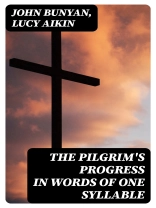The Pilgrim’s Progress in Words of One Syllable presents a captivating reimagining of John Bunyan’s classic allegory, bringing the illustrious journey of Christian to contemporary readers in its most accessible form. This anthology merges the richness of Bunyan’s narrative with the linguistic clarity of Lucy Aikin’s adaptation, inviting reflection on timeless themes such as faith, redemption, and perseverance. By rendering the original text into monosyllabic language, this collection ensures an engaging experience for readers of all ages and language proficiencies, maintaining the profundity of the allegory while offering a refreshing simplicity that accentuates its enduring relevance. Lucy Aikin’s contribution marks a significant cultural endeavor, bridging the gap between complex literary works and a broader audience. Aikin, recognized for her role in simplifying challenging texts without compromising their depth, embodies the didactic spirit of the 19th century. Her work aligns with a transformative era for literature, where educational reforms mirrored a growing demand for accessible knowledge. As a collective, the editors and contributors create an anthology that not only respects the sanctity of Bunyan’s spiritual themes but also enriches them by rendering them more relatable to contemporary discourse. This collection is an invaluable resource for any reader eager to explore Bunyan’s allegorical landscapes through new lenses. It provides a multifaceted journey imbued with educational merit and imaginative breadth, making it an ideal selection for those seeking both linguistic simplicity and narrative complexity. Readers are invited to engage with these texts, experiencing a dialogue that spans centuries, and to immerse themselves in a profound exploration of human aspiration and divine grace. The Pilgrim’s Progress in Words of One Syllable is an exemplary anthology that deepens our appreciation and understanding of one of literature’s most revered journeys.
About the author
John Bunyan (1628-1688) was an English writer and Puritan preacher best known for his Christian allegory ‘The Pilgrim’s Progress’. Born in the village of Elstow, Bedfordshire, Bunyan had a relatively humble beginning before rising to prominence as one of the most important figures of 17th-century English literature. His works reflect his deep religious convictions, forged in the tumult of the English Civil War and the complex aftermath that affected religious expression in England. Bunyan’s ‘The Pilgrim’s Progress in Words of One Syllable’ is an adapted form of his original ‘The Pilgrim’s Progress’, first published in 1678. This adaptation reflects his desire to make theological and moral topics accessible to a broader readership, including children and those with limited literacy. The allegorical tale journeys through the spiritual experiences of its protagonist, Christian, from a life of sin to salvation. It has been hailed for its simple, direct narrative style and vivid imagery, which have ensured its status as a literary classic. Bunyan’s work was revolutionary in its use of straightforward language to express complex religious concepts, and it has been translated into more than 200 languages, testifying to its universal appeal and enduring legacy in Christian literature (Hill, 1994; Sharrock, 1963). His literary style combines a clear, plain-speaking voice with powerful didactic intent, making Bunyan a literary forefather of accessible theological discourse.












